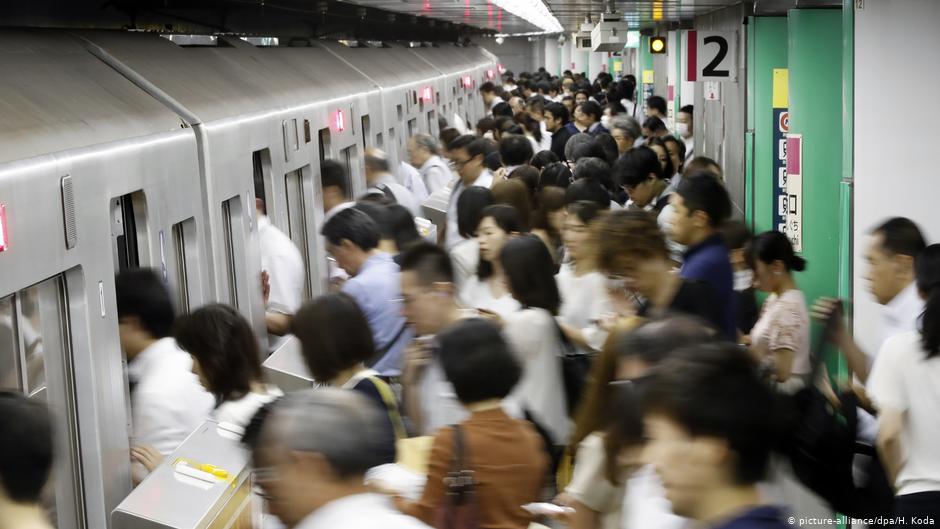
Japanese employees are famous for putting in agonizingly long hours at their desks and declining to take all their annual holidays for fear of inconveniencing office colleagues. But changes that were becoming evident in society have been exacerbated by the coronavirus pandemic.
Members of the Japanese parliament on Wednesday opened discussions on a proposal put forward by Kuniko Inoguchi, a member of the ruling Liberal Democratic Party, to permit workers to opt for a four-day working week instead of the traditional five-day, Monday-to-Friday pattern.
A handful of Japanese companies have already instituted flexible working systems, but the changes wrought on the corporate landscape by COVID-19 have hastened the debate on the issue.
And the early signs are that it would have the support of workers and companies.
“I would say that rather than being a possibility at companies, it should be a necessity,” Teruo Sakurada, a professor of business at Osaka’s Hannan University, told DW.
Economy under pressure
“Japan’s economic system is under a great deal of pressure – made more acute by the pandemic. We we need to make changes to ensure that it is sufficiently resilient and able to meet the needs of companies in the future,” he said.
In recent decades, Japan has shifted from an economy that is based on manufacturing to one that is more reliant on the service sector and financial services. That trend will continue as the nation’s population continues to contract from 126.5 million at present to possibly as few as 83 million by the end of the century.
“These changes mean that Japan has to be far more efficient in the future, and we need to find ways to improve both working conditions for people and the amount of leisure time that they can enjoy,” Sakurada added.
Most immediately, Sakurada wants changes in the working environment for millions of Japanese to bring an end to “karoshi,” the primarily Japanese problem of death brought on by overwork.
A 2016 government study determined that one in five Japanese workers were at risk of karoshi, with nearly a quarter of companies requiring staff to put in more than 80 hours or overtime each month, often unpaid. As a consequence, several hundred people were dying every year of heart attacks, strokes or other medical problems brought on by overwork, with more driven to suicide.
A new law went into effect in April 2019 that limited overwork to 100 hours a month and imposed fines on companies that broke the rules. Critics point out that there are loopholes in the law, which Sakurada hopes reducing the working week might help to close.
Karoshi crisis
“This law would enable more people to work fewer hours and be less stressed, which would in turn reduce the likelihood of karoshi,” Sakurada said, adding that it would also create new employment opportunities.
Inoguchi said the pandemic has shown that Japan “has the latent ability to create flexible work environments and work styles.” The lawmaker pointed out that enabling workers to choose to have a three-day weekend would give them more opportunities to spend time with their children or elderly relatives, pursue educational opportunities, examine the possibility of other business ventures and contribute to the national economy by consuming.
It is also considered likely that couples who want to have more children but fear they just do not have the time to raise youngsters, might change their minds and have larger families. That, in turn, would help to reverse the problem of a declining population.
The major drawback that has been identified is, inevitably, the lower wage associated with working one day less per week. But that has not proved a complete deal-breaker at companies that have already introduced the option of a four-day working week.
Both Microsoft Japan and the Mizuho Financial Group have introduced schemes under which staff can choose to cut a day off their week, while Fast Retailing, the company behind the Uniqlo chain of clothing stores, first gave staff the option of four-day weeks back in 2015.
“We introduced a range of changes designed to make the working environment better for our staff primarily because we wanted to retain our best talent,” said Pei-chi Tung, a spokeswoman for the company.
‘Worker-friendly environment’
“We knew that we needed to make Uniqlo a worker-friendly environment. Giving employees the option of working four days and then having a long weekend every week was part of that,” she told DW.
The system has proved quite popular, Tung said, although a majority of people still prefer to work the traditional five-day week. But they agree that it’s a good option to have if they suddenly find that a family member is ill or there are other reasons that they need a bit more time off, she added.
Inoguchi’s proposal would see the government extend financial support, in the early stages, for companies that introduce reduced working weeks.
Perhaps the biggest obstacle to a widespread acceptance of the system, however, would be from older and traditionally minded manager-level employees, who put in the long hours to build Japan into the economic powerhouse that it is today. They are likely to frown upon a new generation of workers not showing quite the same commitment to the company and the nation.
By Julian Ryall (Tokyo)




